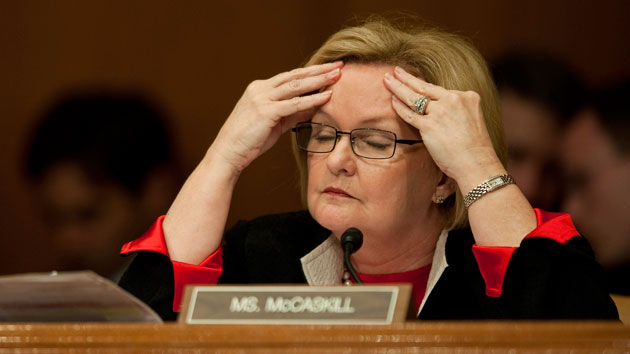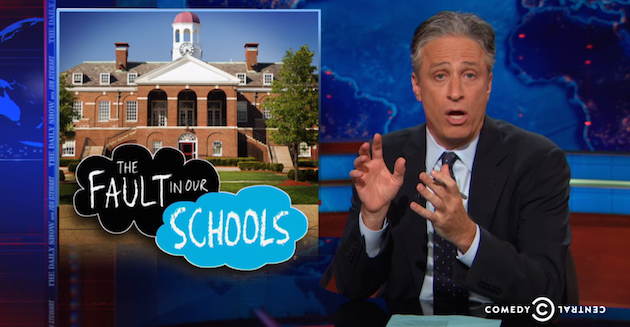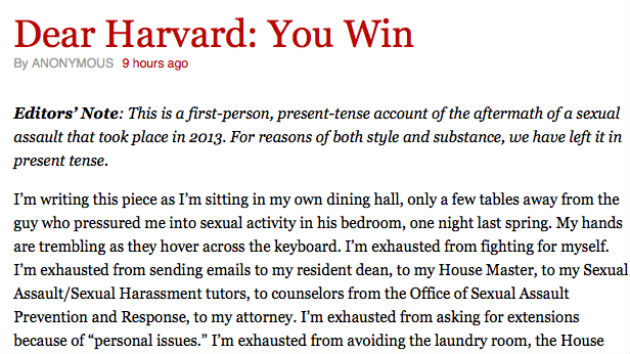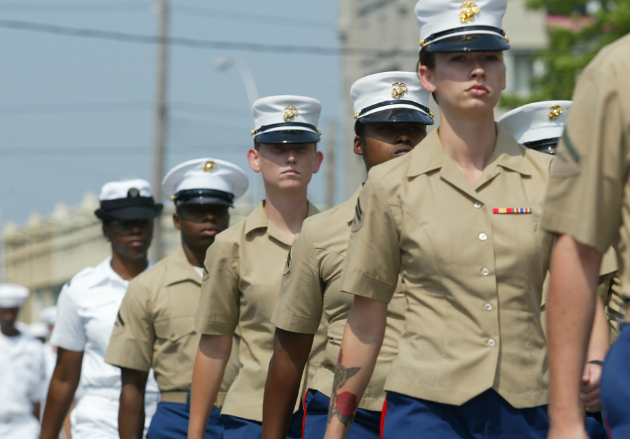
Pete Marovich/ZUMA
According to the results of a national survey commissioned by Sen. Claire McCaskill (D-Mo.) and the Senate Subcommittee on Financial and Contracting Oversight, nearly half the country’s four-year colleges haven’t conducted a single sexual assault investigation in the past five years. The survey was completed by 236 four year-institutions across the country—private and public, small and large—but in order to encourage candid reporting, the names of the schools surveyed were not released.
Here’s what scores of survivors of sexual assault in college have to deal with, according to the results:
- Simply not receiving an investigation: Forty-one percent of schools hadn’t investigated a single sexual assault in the past five years, despite the fact that, according to the Centers for Disease Control and the White House, one in five undergraduate women experience sexual assault during college. Meanwhile, more than 20 percent of the country’s largest private schools conducted fewer investigations than the number of sexual assault incidents that they reported to the Department of Education.
- Having no clue what to do: One in three schools don’t train students on what constitutes sexual assault or how to respond to it. Among private, for-profit schools, 72 percent don’t provide students with any sexual assault training.
- Untrained, uncoordinated law enforcement: Though in general colleges work with a number of parties to keep campuses safe—like campus police, security guards, and local law enforcement—30 percent don’t actually train the school’s law enforcement on how to handle reports of sexual assault, while a staggering 73 percent of institutions don’t have protocols on how the school should work with local law enforcement to respond to sexual assault.
- The athletic department deciding if you were raped: Yes, you read that correctly. Thirty percent of public colleges give the athletic department oversight of sexual violence cases involving athletes.
- Your peers deciding if you were raped: Experts agree that students shouldn’t be part of adjudication boards in sexual assault cases—friends or acquaintances of the survivor or alleged perpetrator face a conflict of interest, and those involved in a sexual assault likely don’t want to divulge the details of the assault to, say, someone they recognize from chemistry class. Still, 27 percent of schools reported students participating in the adjudication of sexual assault claims.
- Untrained faculty, staff, and medical professionals: Often, the first person to whom a student reports sexual assault is a member of the college’s faculty or staff. But 20 percent of schools don’t provide any sexual assault response training to faculty and staff, and only 15 percent of schools provide access to Sexual Assault Nurse Examiners—nurses who are trained to provide medical and other services to survivors of sexual assault.
- Knowing that the perpetrator still plays sports and goes to frat parties: Only 51 percent of schools impose athletic team sanctions against student-athletes who have been deemed perpetrators of sexual assault, and 31 percent impose fraternity or sorority sanctions.
- Seeing the perpetrator on campus, even if you don’t want to: Nineteen percent of institutions don’t impose orders that would require the perpetrator of the assault to avoid contact with the survivor.
McCaskill says that the results of the survey demonstrate failures at “nearly every stage of institutions’ response” to sexual assault. Together with Sens. Richard Blumenthal (D-Conn.) and Kirsten Gillibrand (D-N.Y.), she plans to unveil legislation addressing the campus assault later in the summer.

















